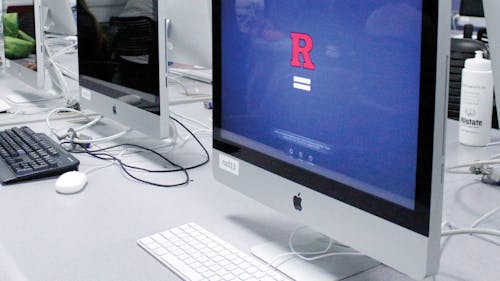Barchi talks current state, future of technology at Rutgers

Technology is key to the future of Rutgers, said University President Robert L. Barchi during an exclusive interview The Daily Targum had with him and his senior staff last Monday.
Barchi also provided a rather disturbing statistic: Rutgers is anywhere from 15 to 20 years behind where it should be in terms of technology infrastructure.
Barchi made various comments on how he plans to improve the state of technology at Rutgers.
“Part of the problem is that we do not yet have the platform to support all this [changing technology],” he said.
The problem isn’t becoming the best of the breed compared to other universities, Barchi said, but how to reach the already-existing standards of the higher educational community.
He said there is a “multi-year” plan in the works to improve the University’s technology infrastructure.
The complexity of this project has been made more strenuous by the recent Rutgers-UMDNJ merge, said Richard Edwards, chancellor at Rutgers-New Brunswick.
“[UMDNJ] runs on a different system,” Edwards said. “The two systems don’t talk to each other and now we have the curious situation where two students in a doctoral program are in the same class, but are in two different information systems.”
Edwards and Barchi assured that the two systems will eventually be integrated, but there are still other discontinuities between systems.
Email is a notable example.
There are currently 128 email systems presently being used across the University, Barchi said. Different administrators run many of these systems, making them difficult to maintain.
“When a crisis like Hurricane Sandy comes, we don’t even have a way to get them all back up,” Barchi said.
But email is an area that’s already being improved. Rutgers recently switched student email over to Scarletmail, outsourcing emails to Google’s Apps for Education.
This frees up university IT staff and gives them more time to focus on other problems, such as providing students unlimited free cloud storage from Google.
These improvements are all centered around the increasingly critical role technology has in education, Barchi said.
Barchi said technology is one of two areas being focused on by a special task force. The other area is general organization of the university.
“The way I see education five years from now isn’t everyone jamming onto scarlet buses to move across campus to get to their [200-level biology] course,” he said. “It’s a course partially given to everybody online.”
This could be done partially through lectures being streamed at the same time throughout various classrooms, he said.
Holding large lectures over the Internet is one way to foster smaller group discussions when students are face-to-face with instructors, Barchi said. This would make better use of time spent in a physical classroom.
Barchi said Rutgers already offers courses for students who aren’t present on campus, such as MOOC’s (or massively open online courses) and online courses.
“I’m talking about the students that are here, maybe commuting here two or three days a week for the smaller groups and doing the bigger lecture at home on their computer,” Barchi said. “There are a myriad of ways we can use technology to do that.”
One important area the president and his staff didn’t mention was online portals, such as Sakai and eCollege.
Sakai doesn’t provide a consistent experience between classes, and eCollege doesn’t display properly on many mobile devices. If hybrid-online classes really are the future, the class portals students’ use for those courses should be a bigger area of focus.
But there is a silver lining in being a little bit behind the technological-curve, Barchi said.
“We can avoid some of the intermediate steps, so we can skip right to where we need to go for the future,” he joked.
Overall, Barchi painted a pleasantly transparent picture of technology at the University.
Technology is clearly an area the president and his staff discuss often. That’s good news not just for the future of students, but for the future of the university as a whole.



